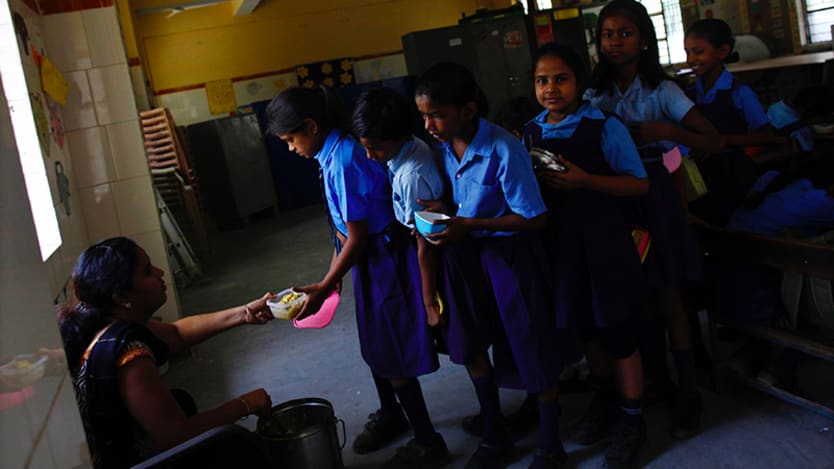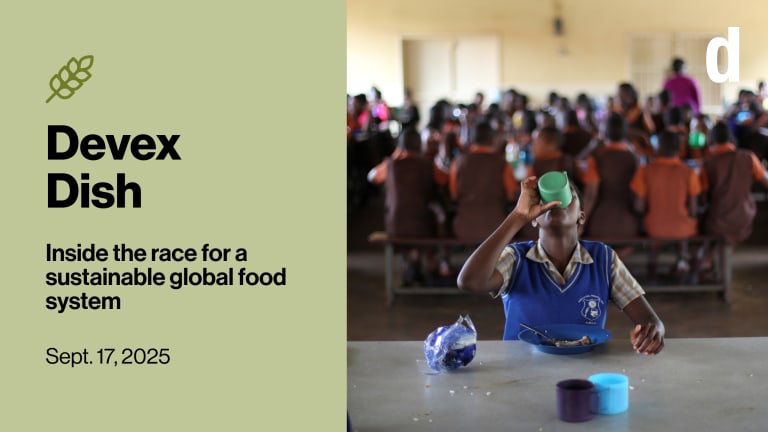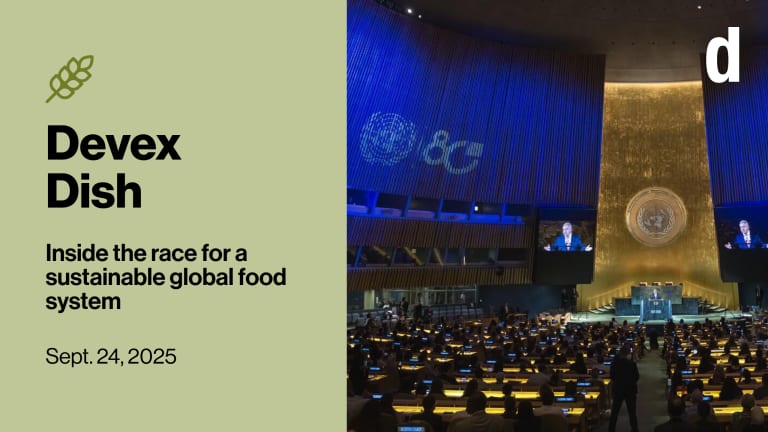Single largest donor for school meals calls for better success metrics

SIEM REAP, CAMBODIA — The biggest international donor to school meal programs wants better metrics of the program’s success — and more evidence of recipient government’s commitment toward self-sustainability.
The call for success metrics and country commitments come as the McGovern-Dole International Food for Education and Child Nutrition Program, under the U.S. Department of Agriculture, faces increased scrutiny back home and is under threat of being abolished. The program provides in-kind U.S. food aid and financial technical assistance for school feeding and child nutrition projects in approximately 24 countries.
“We are now in an environment where there's a tremendous amount of scrutiny for the effectiveness of school feeding around the world. We struggle every single day trying to come up with metrics that show success for school feeding … And our programs are at risk of being cut,” Ben Muskovitz, director and senior advisor on food assistance programs at USDA told a packed audience of government representatives and aid organizations on Tuesday at the annual Global Child Nutrition Forum in Siem Reap, Cambodia.
According to U.S. President Donald Trump’s budget proposals, the program has been under the chopping board, with the argument that it’s a high-cost investment with “little to no returns.” The program also has “unaddressed oversight and performance monitoring challenges,” according to the proposals.
Muskovitz said traditional metrics, such as counting the number of students that go to school or the number of school feeding centers available, don’t cut it anymore.
Instead, stakeholders working on school meal programs should look at nontraditional ways of measuring commitment and success, such as governments providing warehouse space and trucks to transport food commodities for school feeding, he said. In Rwanda, the U.S. official mentioned how the government gave an unused land to parent cooperatives to produce maize for school children.
“This is something that didn't cost the government much, [but] that's an input, that's a metric I can value. I can put a number on them and show host country commitment,” he said.
He also called on other donor countries to step-up their support for school feeding.
“Something happened along the way in the last 10 years and your direct investment has dropped. That maybe a critical statement, but it's true,” he said.
Muskovitz repeatedly underscored the need for countries to invest in their own school feeding programs, and show quantifiable evidence that “countries care as much about school feeding as donors who are committing millions and millions of dollars to these issues.”
“That may not be a very popular message, but it's one that I'm being continually asked … and one that everyone needs to consider,” he said.
“The question that my boss asks me when we present our recommendations is ... what the host country is putting on the table? how they lead to graduation and sustainability? We are in the business of providing school feeding, and our goal is to get out of school feeding and move on to the next country or the next region, or the next issue,” Muskovitz said.
A new survey aims to address some of those questions.
The Global Child Nutrition Foundation has come up with a global survey that paints a picture of countries’ school feeding programs. Arlene Mitchell, the foundation’s executive director, told Devex the main purpose of the surveys was to get governments to realize the gaps in their school meal programs and opportunities for intervention. For example, the survey looks at whether the programs are helping create jobs in the community, particularly women.
“We ask questions that traditionally have not been asked, like how many jobs are you creating through your school health program? And it's getting them to think that, ‘Oh, we are creating jobs and we could probably create jobs specifically for underserved groups,’” she said.
But the survey is also meant to clear some donor misunderstandings — previously there’s been no data on what governments are contributing to school meal programs.
“I work pretty closely with some of the U.S. donors to school feeding programs. I've worked with donors all over the world in my previous jobs, and I think there was a misunderstanding from donors about the priority that countries put on feeding their own children,” Mitchell said.
“Now ... the data is showing very clearly that governments are contributing a great deal to these programs,” she said.
Muskovitz said the survey “is a great step forward, but I need to know what other countries are doing, and what the host country is doing. That information is not there.”
Update, Dec. 6, 2019: This article has been updated to clarify that the budget proposals are putting the McGovern-Dole International Food for Education Program on the chopping board.
The reporter traveled to Siem Reap, Cambodia with support from the Global Child Nutrition Foundation. Devex maintains full editorial control of the content.
This focus area, powered by DSM, is exploring innovative solutions to improve nutrition, tackle malnutrition, and influence policies and funding. Visit the Focus on: Improving Nutrition page for more.
Search for articles
Most Read
- 1
- 2
- 3
- 4
- 5








